虚拟语气讲义与练习
虚拟语气讲解和练习(附答案)
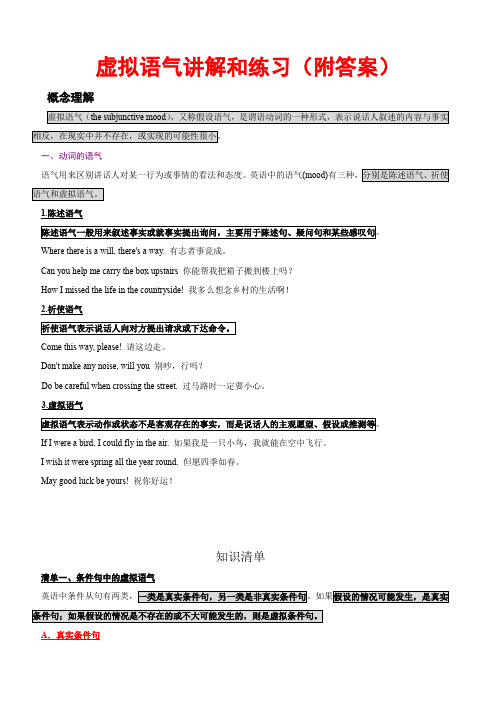
虚拟语气讲解和练习(附答案)概念理解一、动词的语气语气用来区别讲话人对某一行为或事情的看法和态度。
英语中的语气(mood)1.陈述语气Where there is a will, there's a way. 有志者事竟成。
Can you help me carry the box upstairs 你能帮我把箱子搬到楼上吗?How I missed the life in the countryside! 我多么想念乡村的生活啊!2.祈使语气Come this way, please! 请这边走。
Don't make any noise, will you 别吵,行吗?Do be careful when crossing the street. 过马路时一定要小心。
3.虚拟语气If I were a bird, I could fly in the air. 如果我是一只小鸟,我就能在空中飞行。
I wish it were spring all the year round. 但愿四季如春。
May good luck be yours! 祝你好运!知识清单清单一、条件句中的虚拟语气A.真实条件句If he doesn't come at 8, we won't wait for him. 如果他八点不来,我们就不等他了。
If a flood happened in the past, there was usually a great loss of life and property. 过去发生洪水的话,常有很大的生命和财产损失。
We shall go there unless it rains tomorrow. 如果明天不下雨,我们将去那里。
I'll let you use my bike on condition that you keep it clean. 如果你能保持车子干净,我就让你用我的自行车。
虚拟语气讲义及练习

虚拟语气一、语气的定义和种类l、语气:语气是动词的一种形式,它表示说话人对某一行为或事情的看法和态度。
2、语气的种类:(1)陈述语气: 表示动作或状态是现实的、确定的或符合事实的,用于陈述句、疑问句和某些感叹句。
如:We are not ready. 我们没准备好。
What a fine day it is!多好的天气啊!(2)祈使语气: 表示说话人的建议、请求、邀请、命令等。
如: Open the door, please。
请打开门。
(3)虚拟语气: 表示动作或状态不是客观存在的事实,而是说话人的主观愿望、假设或推测等。
如: If I were you, I should study English. 如果我是你,我就学英语了。
May you succeed! 祝您成功!二、虚拟语气在条件从句中的用法条件句有两类,一类是真实条件句,一类是虚拟条件句。
如果假设的情况是有可能发生的,就是真实条件何。
在这种真实条件句中的谓语用陈述语气。
如: If it doesn’t rain tomorrow, we will go to the park. 如果明天不下雨,我们就去公园。
如果假设的情况是过去或现在都不存在的,或将来不大可能发生的,则是虚拟条件句。
如: If he had seen you yesterday, he would have asked you about it. 如果他昨天见到你,他会问你这件事的。
(事实上他昨天没见到你,因此也未能问你这件事。
)在含有虚拟条件句的复合句中,主句和从句的谓语都要用虚拟语气。
现将虚拟条件从句和主注: 主句中的should只用于I、we,但在美国英语中,should常被would代替;从句中的should 可用于各种人称。
l、表示与现在事实相反的假设和结果。
如: If my brother were here, everything would be all right. 要是我哥哥在这儿,一切都没问题了。
高考虚拟语气讲义及练习

1、掌握虚拟语气在非真实条件句、主语从句、宾语从句、表语从句、同位语从句、状语从句中的运用;2、了解几种特殊的虚拟语气一、非真实条件句中的虚拟语气(if)条件状语从句的谓语形式主句的谓语形式与现在事实相反一般过去式(be—were)would/could/might/should+do与过去事实相反过去完成时had+done would/could/might/should+have done与将来事实相反①一般过去式②should+do③were to do would/could/might/should+do教学目标语法梳理1.I am not free today. If Ifree today , I and visit some of my friends .A. am will goB. were, would goC. shall beD. be, must go2. If my lawyer ___ here last Saturday, he __ me from going .A. had been, would have preventedB. had been, would preventC. were, would preventD. were, would have prevented3.If I were to see Tom, what ___ you ___ me to tell him?A. are, going to askB. do, askC. would, askD. did, ask二、宾语从句中的虚拟语气1. wish 后面宾语从句中的虚拟语气,表示与事实相反的愿望。
其表达形式一般是将从句的谓语动词退后一个时态。
ege: I wish I were (be) as healthy as you.I wish that I had (have) a plane.ege: I wish I had been to (have been to) the concert last night. I wish you had written (write) to him.考点直击①与现在事实相反 : wish + (that)+did(were)②与过去事实相反 : wish + (that)+had done③与将来事实相反: wish + would/could/might+doI wish he would forgive me.ege: I wish he would come (come) soon.2.在某些动词后的宾语从句中需用should+动词原形的虚拟语气形式。
第25讲 虚拟语气(讲义)(教师版) 2025年高考英语一轮复习讲练测(新教材新高考)

第25讲虚拟语气目录01 考情透视·目标导航∙∙∙∙∙∙∙∙∙∙∙∙∙∙∙∙∙∙∙∙∙∙∙∙∙∙∙∙∙∙∙∙∙∙∙∙∙∙∙∙∙∙∙∙∙∙∙∙∙∙∙∙∙∙∙∙∙∙∙∙∙∙∙∙∙∙∙∙∙∙∙∙∙∙∙∙∙∙∙∙∙∙∙∙∙∙∙∙∙∙∙∙∙∙∙∙∙∙∙∙∙∙∙∙∙∙∙∙∙∙∙∙∙∙∙∙∙∙∙∙∙∙102 知识导图·思维引航∙∙∙∙∙∙∙∙∙∙∙∙∙∙∙∙∙∙∙∙∙∙∙∙∙∙∙∙∙∙∙∙∙∙∙∙∙∙∙∙∙∙∙∙∙∙∙∙∙∙∙∙∙∙∙∙∙∙∙∙∙∙∙∙∙∙∙∙∙∙∙∙∙∙∙∙∙∙∙∙∙∙∙∙∙∙∙∙∙∙∙∙∙∙∙∙∙∙∙∙∙∙∙∙∙∙∙∙∙∙∙∙∙∙∙∙∙∙∙∙∙∙203 考点突破·考法探究∙∙∙∙∙∙∙∙∙∙∙∙∙∙∙∙∙∙∙∙∙∙∙∙∙∙∙∙∙∙∙∙∙∙∙∙∙∙∙∙∙∙∙∙∙∙∙∙∙∙∙∙∙∙∙∙∙∙∙∙∙∙∙∙∙∙∙∙∙∙∙∙∙∙∙∙∙∙∙∙∙∙∙∙∙∙∙∙∙∙∙∙∙∙∙∙∙∙∙∙∙∙∙∙∙∙∙∙∙∙∙∙∙∙∙∙∙∙∙∙∙∙3考点一if引导的虚拟语气条件句知识点1 if引导的虚拟语气典型用法∙∙∙∙∙∙∙∙∙∙∙∙∙∙∙∙∙∙∙∙∙∙∙∙∙∙∙∙∙∙∙∙∙∙∙∙∙∙∙∙∙∙∙∙∙∙∙∙∙∙∙∙∙∙∙∙∙∙∙∙∙∙∙∙∙∙∙∙∙∙∙∙∙∙∙∙∙∙∙∙∙∙∙3知识点2 虚拟语气的省略和倒装∙∙∙∙∙∙∙∙∙∙∙∙∙∙∙∙∙∙∙∙∙∙∙∙∙∙∙∙∙∙∙∙∙∙∙∙∙∙∙∙∙∙∙∙∙∙∙∙∙∙∙∙∙∙∙∙∙∙∙∙∙∙∙∙∙∙∙∙∙∙∙∙∙∙∙∙∙∙∙∙∙∙∙∙∙∙∙∙∙∙∙4知识点3 错综虚拟语气∙∙∙∙∙∙∙∙∙∙∙∙∙∙∙∙∙∙∙∙∙∙∙∙∙∙∙∙∙∙∙∙∙∙∙∙∙∙∙∙∙∙∙∙∙∙∙∙∙∙∙∙∙∙∙∙∙∙∙∙∙∙∙∙∙∙∙∙∙∙∙∙∙∙∙∙∙∙∙∙∙∙∙∙∙∙∙∙∙∙∙∙∙∙∙∙∙∙∙∙∙∙∙∙∙∙∙∙4知识点4 含蓄虚拟语气∙∙∙∙∙∙∙∙∙∙∙∙∙∙∙∙∙∙∙∙∙∙∙∙∙∙∙∙∙∙∙∙∙∙∙∙∙∙∙∙∙∙∙∙∙∙∙∙∙∙∙∙∙∙∙∙∙∙∙∙∙∙∙∙∙∙∙∙∙∙∙∙∙∙∙∙∙∙∙∙∙∙∙∙∙∙∙∙∙∙∙∙∙∙∙∙∙∙∙∙∙∙∙∙∙∙∙∙5考点二虚拟语气用于名词性从句知识点1 虚拟语气用于宾语从句∙∙∙∙∙∙∙∙∙∙∙∙∙∙∙∙∙∙∙∙∙∙∙∙∙∙∙∙∙∙∙∙∙∙∙∙∙∙∙∙∙∙∙∙∙∙∙∙∙∙∙∙∙∙∙∙∙∙∙∙∙∙∙∙∙∙∙∙∙∙∙∙∙∙∙∙∙∙∙∙∙∙∙∙∙∙∙∙∙∙∙6知识点2 虚拟语气用于表语、同位语从句∙∙∙∙∙∙∙∙∙∙∙∙∙∙∙∙∙∙∙∙∙∙∙∙∙∙∙∙∙∙∙∙∙∙∙∙∙∙∙∙∙∙∙∙∙∙∙∙∙∙∙∙∙∙∙∙∙∙∙∙∙∙∙∙∙∙∙∙∙∙∙∙∙∙∙7知识点3 虚拟语气用于主语从句∙∙∙∙∙∙∙∙∙∙∙∙∙∙∙∙∙∙∙∙∙∙∙∙∙∙∙∙∙∙∙∙∙∙∙∙∙∙∙∙∙∙∙∙∙∙∙∙∙∙∙∙∙∙∙∙∙∙∙∙∙∙∙∙∙∙∙∙∙∙∙∙∙∙∙∙∙∙∙∙∙∙∙∙∙∙∙∙∙∙∙7考点三虚拟语气用于状语从句知识点1 as if/though、even if/though引导的虚拟语气∙∙∙∙∙∙∙∙∙∙∙∙∙∙∙∙∙∙∙∙∙∙∙∙∙∙∙∙∙∙∙∙∙∙∙∙∙∙∙∙∙∙∙∙∙9知识点2 虚拟语气用于if only句型∙∙∙∙∙∙∙∙∙∙∙∙∙∙∙∙∙∙∙∙∙∙∙∙∙∙∙∙∙∙∙∙∙∙∙∙∙∙∙∙∙∙∙∙∙∙∙∙∙∙∙∙∙∙∙∙∙∙∙∙∙∙∙∙∙∙∙∙∙∙∙∙∙∙∙∙∙∙∙∙∙∙∙∙9考点四虚拟语气的其它句式∙∙∙∙∙∙∙∙∙∙∙∙∙∙∙∙∙∙∙∙∙∙∙∙∙∙∙∙∙∙∙∙∙∙∙∙∙∙∙∙∙∙∙∙∙∙∙∙∙∙∙∙∙∙∙∙∙∙∙∙∙∙∙∙∙∙∙∙∙∙∙∙∙∙∙∙∙∙∙∙∙∙∙∙∙∙∙∙∙∙∙∙∙∙∙∙∙∙∙∙∙∙∙∙∙∙10 04真题练习·命题洞现1.真题实战∙∙∙∙∙∙∙∙∙∙∙∙∙∙∙∙∙∙∙∙∙∙∙∙∙∙∙∙∙∙∙∙∙∙∙∙∙∙∙∙∙∙∙∙∙∙∙∙∙∙∙∙∙∙∙∙∙∙∙∙∙∙∙∙∙∙∙∙∙∙∙∙∙∙∙∙∙∙∙∙∙∙∙∙∙∙∙∙∙∙∙∙∙∙∙∙∙∙∙∙∙∙∙∙∙∙∙∙∙∙∙∙∙∙∙∙∙∙∙∙∙∙∙∙∙∙∙∙112.命题演练∙∙∙∙∙∙∙∙∙∙∙∙∙∙∙∙∙∙∙∙∙∙∙∙∙∙∙∙∙∙∙∙∙∙∙∙∙∙∙∙∙∙∙∙∙∙∙∙∙∙∙∙∙∙∙∙∙∙∙∙∙∙∙∙∙∙∙∙∙∙∙∙∙∙∙∙∙∙∙∙∙∙∙∙∙∙∙∙∙∙∙∙∙∙∙∙∙∙∙∙∙∙∙∙∙∙∙∙∙∙∙∙∙∙∙∙∙∙∙∙∙∙∙∙∙∙∙∙13考点一 if 引导的虚拟语气虚拟语气: 表示动作或状态不是客观存在的事实,而是说话人的主观愿望、假设或推测等。
虚拟语气(讲义及练习)

虚拟语气虚拟语气表示说话人的难以实现的愿望或假设,或者表达建议,命令,劝告等语气,不表示客观事实。
虚拟语气是通过谓语动词的词性变换来实现的。
I.带If条件句的虚拟语气3.需要注意的几点重要问题1)should通常只用于第一人称,would可用于任何人称。
有时候也可用might,could。
2)一般情况下,主从句所指的时间是一致的,但有时候也可能不一致,这时候应对主句和从句的时间分别进行分析,从而确定主从句谓语动词各自的正确形式。
1)If you had taken his advice, you wouldn’t be in such a big trouble now.2)If I had finished my homework yesterday, I would go out with you tomorrow.3)当If条件句中含有were, had, should的时候,可以省略if,并将were, had, 或should移到句首形成倒装,句子的其余部分保持不变。
1)Had she got more money, she would have finished his MA study.2)Should there be a meeting tomorrow, I would come.3)Were I in school again, I would work harder.4)Were I to meet him tomorrow, I should ask him about the result.II.含蓄条件句有些条件句中并不出现if,而是使用介词短语(but for; with; without等)或是连接词(but; but that; or; otherwise等),此时并不是全句都需要使用虚拟语气,要根据具体的句意来确定句子应该使用虚拟语气的部分,并按照含有if条件句虚拟语气的主句谓语动词变换规则进行动词变换。
虚拟语气讲解及练习题(含答案和解释)

高中英语虚拟语气讲解及练习虚拟条件句就是对现实条件的一种虚拟假设,所假设的条件一般不符合事实或与事实相反或在现实中发生的可能性极小。
根据时间的不同,虚拟条件句可分为三种,即与现在事实相反的虚拟条件句、与过去事实相反的虚拟条件句(1)表示与现在事实相反If I had enough money now, I would lend it to you.(2)表示与过去事实相反If he had taken your advice, he wouldn’t have made such a bad mistake.(3)表示与将来事实相反I would go shopping with you if it were to be Sunday tomorrow.1. 虚拟条件句的倒装在虚拟条件句中,为了强调所假设条件的虚拟性,或突出说话人的一种主观愿望,虚拟条件句可用倒装结构。
虚拟条件句的倒装是通过去掉if,把条件从句谓语中的助动词、情态动词或系动词放在句首实现的。
例如:Had I been(= If I had been ) in that situation, I would not have let the thief escape away with so much money.Should there be (= If there should be) a drought, what should we do at that time ?2. 错综时间条件句有时条件从句的动作和主句的动作发生的时间并不一致,这时谓语动词的形式应根据它所要表示的具体时间来确定。
例如:If we hadn’t been working hard in the past few years ,thing s wouldn’t be going so smoothly.3. 含蓄条件句有时假设的情况并不以条件从句的形式表现出来,而是通过某个介词或介词短语(如:with,otherwise,without,but for,in that position)、上下文或其它方式表现出来。
虚拟语气讲义与练习

主句:should/would/could/might+动词原形
If her were you, he would tell her the truth. / I would certainly go if I had the time 2)表示与过去事实(可能)相反, 其形式为:
if从句: had+过去分词
有时侯, 条件从句表示的动作和主句表示的动作, 发生的时间不一致, 这时, 谓语动词的形式要根据
主、从句各自所表示的时间来调整。
If I were you, I would have gone to thee cinema last night / If he had taken my advice, he would be a scientist now.
Subjunctive Mood
虚拟语气是英语动词的一种特殊形式, 它所表达的动作和状态不是客观存在的事 实,而是说话人的主观愿望、请求、意图、命令、假设或猜测等。虚拟语气主要 使用于以下场合:
一、 非真实条件句中的虚拟语气
1. 带 if 的虚拟条件句 1) 表示与现在的事实相反, 其形式为:
if从句:一般过去时(若动词是be, 则用were这个形式,不管是什么人称)
主句:: should /would/could/might+have+过去分词
if he had seen you, he would have helped you /She would have come if she hadn’t been so busy. 3) 表示与将来事实相反或未来实现的可能性极小, 其形式为:
D) Wouldn't you have upset
高考英语虚拟语气专项讲解及练习含答案
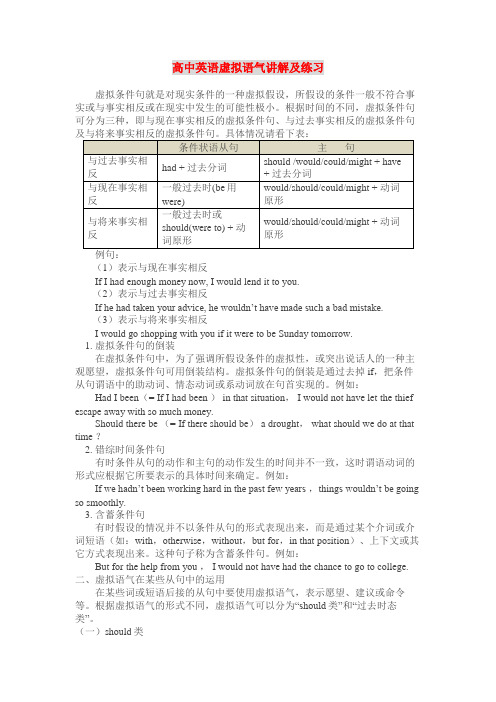
高中英语虚拟语气讲解及练习虚拟条件句就是对现实条件的一种虚拟假设,所假设的条件一般不符合事实或与事实相反或在现实中发生的可能性极小。
根据时间的不同,虚拟条件句可分为三种,即与现在事实相反的虚拟条件句、与过去事实相反的虚拟条件句(1)表示与现在事实相反If I had enough money now, I would lend it to you.(2)表示与过去事实相反If he had taken your advice, he wouldn’t have made such a bad mistake.(3)表示与将来事实相反I would go shopping with you if it were to be Sunday tomorrow.1. 虚拟条件句的倒装在虚拟条件句中,为了强调所假设条件的虚拟性,或突出说话人的一种主观愿望,虚拟条件句可用倒装结构。
虚拟条件句的倒装是通过去掉if,把条件从句谓语中的助动词、情态动词或系动词放在句首实现的。
例如:Had I been(= If I had been ) in that situation, I would not have let the thief escape away with so much money.Should there be (= If there should be) a drought, what should we do at that time ?2. 错综时间条件句有时条件从句的动作和主句的动作发生的时间并不一致,这时谓语动词的形式应根据它所要表示的具体时间来确定。
例如:If we hadn’t been working hard in the past few years ,thing s wouldn’t be going so smoothly.3. 含蓄条件句有时假设的情况并不以条件从句的形式表现出来,而是通过某个介词或介词短语(如:with,otherwise,without,but for,in that position)、上下文或其它方式表现出来。
虚拟语气讲解及练习

虚拟语气的讲解和用法以及练习题虚拟语气表示说话人的主观愿望、猜测、建议或与事实不符的假设等,也可以表示可能性较小的情况或不可能发生的情况,而不是客观存在的事实(表示客观事实要用陈述语气)。
虚拟语气是由句中谓语动词的特殊形式表现出来的。
虚拟语气常用于复合句中,也可用于简单句。
一、if引导的虚拟条件句I. 表示与现在相反:主句:If + 动词过去式(were, did, had, etc.),从句:should / would / could / might + 动词原形e.g.If I had HIV, I would know because I would feel sick.If I were you, I would give an AIDS patient a hug.II. 表示与过去相反:主句:If + had + 过去分词,从句:should / would / could / might + have + 过去分词e.g.If she had told him about the danger, he would not have got hurt.If I had known more about giving first aid, I could have helped them.III. 表示与将来相反:①主句:If + 动词过去式(were, did, had, etc.),从句:should / would / could / might + 动词原形e.g.If the teacher asked me to solve the problem next time, I could try my best.②主句:If + should +动词原形,从句:should / would / could / might + 动词原形e.g. If he shouldfail in the experiment this time, he would try again.③主句:If + were to +动词原形,从句:should / would / could / might +动词原形e.g. If we were to panic, we would not be able to help.If引导的虚拟条件句应该注意的问题1.错综时态虚拟条件句如果从句所假设的谓语动词发生的时间与主句所假设的谓语动词发生的时间不一致, 这种假设条件句叫错综时间条件虚拟语气. 其主句和从句谓语动词的构成要根据所假设的时间而定.1) If I had taken the medicine, I would be better now. 如果我服用了那种药的话, 现在就会好些了.2) If the weather had been finer, the crops would be growing still better. 如果(前些日子)天气更好些, 庄稼一定会长得更好.2. 含蓄条件句有些条件是由一些短语引出的(but for, with, without; otherwise, or, but, etc,) 1) We couldn’t have achieved so much without your help (= If we had not had your help).2) Without solar radiation, animals and plants would die.3) With better equipment, we could have done it better.4) But for electricity (= If there were no electricity), there would be no modern industry.5) I should have returned the book last week, but I was so busy that I forgot to do so.6) He was having a meeting; otherwise he would have come over to help us.7) He felt very tired yesterday, or he would have attended the party.注意:在某些隐含的虚拟条件简单句中, 虚拟语气可通过上下文表现出来. 谓语动词用虚拟形式,如:1) Any men in his position would have done like that.2) You should (ought to) have come earlier.3. 省略if的虚拟条件句如果if虚拟条件句中含有were/should/had的话,则可以省略if,此时应将这三个词放在句首,采用倒装语序。
高考虚拟语气学生讲义及练习,答案(易。中,难)

虚拟语气虚拟语气是一种假设,愿望,建议,或实现不了的空想1 If 引导的非真实条件句的虚拟语气。
(1) 与现在事实相反的虚拟语气。
如:If I were you , I would help him.If he studied at this school, he would know you well.= If he should study at this school, he would know you well.(2) 与过去事实相反的虚拟语气。
如:If I had seen the film, I would have told you about it.(3) 与将来事实相反的虚拟语气。
如:If it were Sunday tomorrow, we would have no school. If 引导的非真实条件句的省略与倒装(1) 必须是非真实条件句,真实条件句中不可省略if 。
(2) 只有当非真实的条件句中有were , had ,should, would 等词时,才可以省略。
(3) If 省略,助动词were, had ,should 等提至主语前,没有助动词的加助动词(1) 与现在事实相反的非真实条件句的省略与倒装If I were you , I would help him.= Were I you , I would help him.(be 提前)If he studied at this school, he would know you well.= Did he study at this school, he would know you well. (无助动词,且为一般过去式,所以加did )If he should study at this school, he would know you well= Should he study at this school, he would know you well (助动词should 提前)( 2 ) 与过去事实相反的非真实条件句的省略与倒装If I had seen the film, I would have told you about it.=Had I seen the film, I would have told you about it. (助动词 had 提前)从句 主句 与现在事实相反 一般过去时 过去将来时 If +主语+V-ed (be 动词只用were ) If+ 主语+should + V 主语+ would / could / should /might do 与过去事实相反 过去完成时 过去将来完成式 If + 主语 +had done 主语+would/could /should/might + have done 与将来事实相反 一般过去时 过去将来时 If +主语+V-ed (be 动词只用were ) If+ 主语+should + V If+ 主语+were to do+ V主语+ would / could / should /might do(3 ) 与将来事实相反的非真实条件句的省略与倒装If it were Sunday tomorrow, we would have no school.= Were it Sunday tomorrow, we would have no school.2 错综时间条件句的虚拟 (if 的非真实条件句从句用过去完成时,主句用过去将来)If you had followed the doctor's advice ,you should be all right now.,要是你那时候听了医生的劝告,你现在就好了。
虚拟语气讲解和练习(附答案)
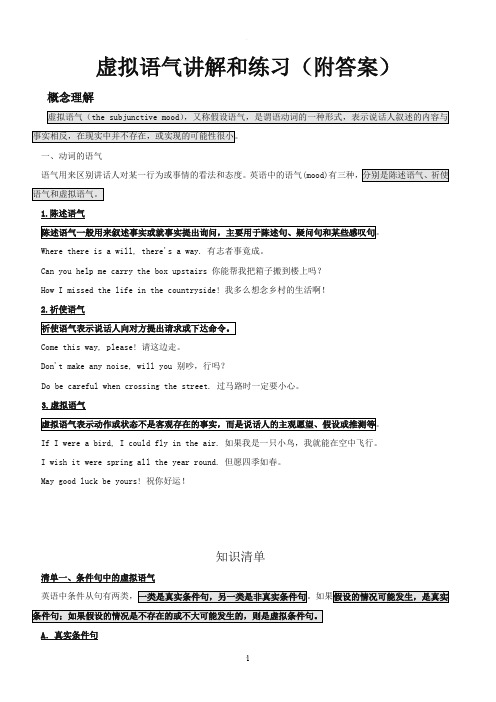
虚拟语气讲解和练习(附答案)概念理解一、动词的语气语气用来区别讲话人对某一行为或事情的看法和态度。
英语中的语气(mood)1.陈述语气Where there is a will, there's a way. 有志者事竟成。
Can you help me carry the box upstairs 你能帮我把箱子搬到楼上吗?How I missed the life in the countryside! 我多么想念乡村的生活啊!2.祈使语气Come this way, please! 请这边走。
Don't make any noise, will you 别吵,行吗?Do be careful when crossing the street. 过马路时一定要小心。
3.虚拟语气If I were a bird, I could fly in the air. 如果我是一只小鸟,我就能在空中飞行。
I wish it were spring all the year round. 但愿四季如春。
May good luck be yours! 祝你好运!知识清单清单一、条件句中的虚拟语气A.真实条件句If he doesn't come at 8, we won't wait for him. 如果他八点不来,我们就不等他了。
If a flood happened in the past, there was usually a great loss of life and property. 过去发生洪水的话,常有很大的生命和财产损失。
We shall go there unless it rains tomorrow. 如果明天不下雨,我们将去那里。
I'll let you use my bike on condition that you keep it clean. 如果你能保持车子干净,我就让你用我的自行车。
虚拟语气详细讲解及经典习题 附答案
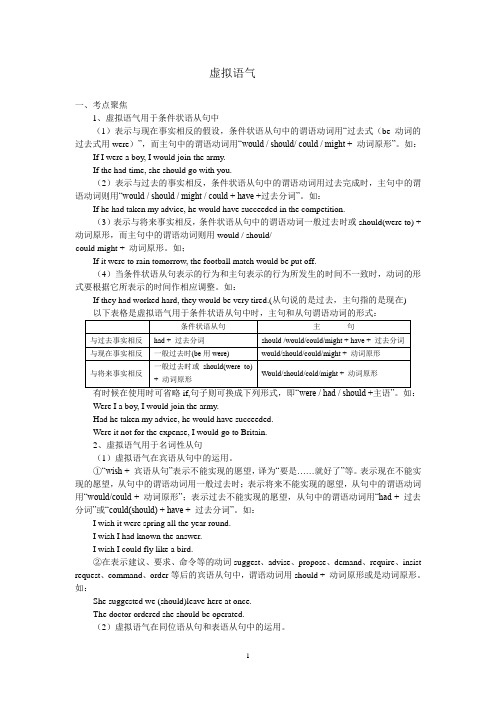
虚拟语气一、考点聚焦1、虚拟语气用于条件状语从句中(1)表示与现在事实相反的假设,条件状语从句中的谓语动词用“过去式(be动词的过去式用were)”,而主句中的谓语动词用“would / should/ could / might + 动词原形”。
如:If I were a boy, I would join the army.If the had time, she should go with you.(2)表示与过去的事实相反,条件状语从句中的谓语动词用过去完成时,主句中的谓语动词则用“would / should / might / could + have +过去分词”。
如:If he had taken my advice, he would have succeeded in the competition.(3)表示与将来事实相反,条件状语从句中的谓语动词一般过去时或should(were to) + 动词原形,而主句中的谓语动词则用would / should/could might + 动词原形。
如;If it were to rain tomorrow, the football match would be put off.(4)当条件状语从句表示的行为和主句表示的行为所发生的时间不一致时,动词的形式要根据它所表示的时间作相应调整。
如:If they had worked hard, they would be very tired.(从句说的是过去,主句指的是现在)Were I a boy, I would join the army.Had he taken my advice, he would have succeeded.Were it not for the expense, I would go to Britain.2、虚拟语气用于名词性从句(1)虚拟语气在宾语从句中的运用。
(完整版)虚拟语气讲解及练习题(含答案和解释)

(完整版)虚拟语气讲解及练习题(含答案和解释)虚拟语气讲解与练习黄志刚2013.10.一. 简介虚拟语气用来表示说话人的主观愿望或假想,而不表示客观存在的事实,所说的是一个条件,不一定是事实,或与事实相反。
虚拟语气通过谓语动词的特殊形式来表示。
英语中的语气分为陈述语气、祈使语气、虚拟语气在什么情况下用虚拟语气? 在表示虚假的、与事实相反的或难以实现的情况时用虚拟语气,表示主观愿望或表示某种强烈情感时,也用虚拟语气。
即当一个人说话时欲强调其所说的话是基于自己的主观想法,而不是根据客观实际,就用虚拟语气。
二. 虚拟语气在非真实条件状语从句中的用法1、真实条件状语从句与非真实条件状语从句真:eg . If he doesn’t hurry up, he will miss the bus. 如果他不快点,他将错过巴士。
( 真实条件状语)(不是虚拟语气)If he is free, he will ask me to tell stories. 如果他是空闲的,他会要求我讲故事。
(真实条件状语)(不是虚拟语气)非真:eg. If I were you, I would go at once.如果我是你,我马上就会去。
(非真实条件状语从句)If there were no air, people would die. 如果没有空气,人就会死亡。
(非真实条件状语从句)2、用法及动词形式1、表示与现在事实相反的情况,例1.If I were you, I would take an umbrella.如果我是你,我会带把伞。
(事实:我不可能是你) 2.If I knew his telephone number, I would tell you. 如果我知道他的电话号码,我就会告诉你。
(事实:不知道) 3.If there were no air orwater, there would be no living things on the earth. 如果没有水和空气,地球上就不会有生物。
虚拟语气讲解及练习(有答案)
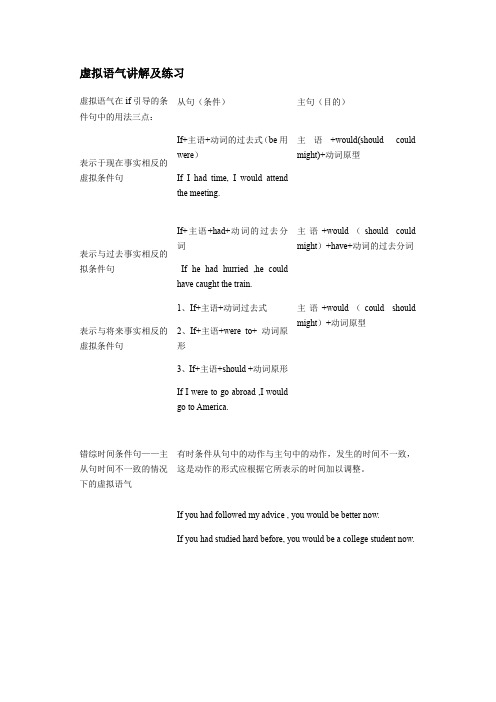
虚拟语气讲解及练习虚拟语气在if引导的条件句中的用法三点:从句(条件)主句(目的)表示于现在事实相反的虚拟条件句If+主语+动词的过去式(be用were)If I had time, I would attendthe meeting.主语+would(should couldmight)+动词原型表示与过去事实相反的拟条件句If+主语+had+动词的过去分词If he had hurried ,he couldhave caught the train.主语+would(should couldmight)+have+动词的过去分词表示与将来事实相反的虚拟条件句1、If+主语+动词过去式2、If+主语+were to+ 动词原形3、If+主语+should +动词原形If I were to go abroad ,I wouldgo to America.主语+would(could shouldmight)+动词原型错综时间条件句——主从句时间不一致的情况下的虚拟语气有时条件从句中的动作与主句中的动作,发生的时间不一致,这是动作的形式应根据它所表示的时间加以调整。
If you had followed my advice , you would be better now.If you had studied hard before, you would be a college student now.though引导的方式状语从句中表示与将来事实相反,(表示将来的可能性不大),用would (might, could)+动词原形He acts as if he could win in the game .注意:1.在as if/as though 句中,如果有可能成为事实,用陈述语气。
例:He looks as if he going to be ill.2.as though或as if引导的状语从句,从句主语和主句主语相同时,从句中可省略主语和部分谓语。
最全的虚拟语气讲解及练习

虚拟语气语气:动词的一种形式,表说话人对发生的动作或所处的状态持有的态度或看法。
英语中包括有:陈述事实的陈述语气;提出请求、命令等的祈使语气;表主观愿望和假想虚拟的虚拟语气。
一、用在一般虚拟条件句中的虚拟语气从句中提出一种与客观现实不相符或根本不可能存在的条件,主句会产生的一种不(1) 将来时的条件句中的虚拟语气。
如:If he should go to Qing Hua University, he would make full use of his time. 如果他要上清华大学的话,他就会充分利用他的时间了。
If he were to come here, he would tell us about it. 如果他要来的话,他会通知我们一声。
(2) 现在时的条件句中的虚拟语气。
如:If he were free, he would help us. 要是他有空的话,它会帮助我们的。
If he studied at this school, he would know you well. 如果他在这所学校学习的话,它会对你很熟悉。
(3) 过去时的条件句中的虚拟语气。
如:If I had seen the film, I would have told you about it. 我如果看过这场电影,我会把电影内容告诉你了。
If I had got there earlier, I would have met Mr. Li. 如果我早点到那儿,我就会会到了李先生。
运用条件句中的虚拟语气时,须注意的几个问题有时,虚拟条件句中,主、从句的动作若不是同时发生时,须区别对待。
①从句的动作与过去事实相反,而主句的动作与现在或现在正在发生的事实不符。
如:If I had worked hard at school, I would be an engineer, too. 如果我在学校学习刻苦的话,我现在也会是工程师了If they had informed us, we would not come here now. 如果他们通知过我们的话,我们现在就不会来这里了。
虚拟语气讲解及练习

虚拟语气讲解及练习虚拟语气用来表示说话人的主观愿望或假想,而不表示客观存在的事实,所说的是一个条件,不一定是事实,或与事实相反。
虚拟语气通过谓语动词的特殊形式来表示。
英语中的语气分为陈述语气、祈使语气、虚拟语气三类。
二. 应用条件虚拟语气常在表示条件和结果的状语从句中。
在表示与事实相反的虚拟语气时动词有三种时态:现在时,过去时,将来时,过去完成时,现在完成时。
在条件句中的应用:条件句可分为两类,一类为真实条件句,一类为非真实条件句。
非真实条件句表示的是假设的或实际可能性不大的情况,故采用虚拟语气。
在什么情况下用虚拟语气? 在表示虚假的、与事实相反的或难以实现的情况时用虚拟语气,表示主观愿望或表示某种强烈情感时,也用虚拟语气。
即当一个人说话时欲强调其所说的话是基于自己的主观想法,而不是根据客观实际,就用虚拟语气。
三. 虚拟语气在非真实条件状语从句中的用法1、真实条件状语从句与非真实条件状语从句eg . If he doesn’t hurry up, he will miss the bus. 如果他不快点,他将错过巴士。
( 真实条件状语)(不是虚拟语气)If he is free, he will ask me to tell stories. 如果他是空闲的,他会要求我讲故事。
(真实条件状语)(不是虚拟语气)eg. If I were you, I would go at once.如果我是你,我马上就会去。
(非真实条件状语从句)If there were no air, people would die. 如果没有空气,人就会死亡。
(非真实条件状语从句)2、用法及动词形式1、表示与现在事实相反的情况:if+主语+过去时+其他+主语+should/would/could/might+do+其他例.1.If I were you, I would take an umbrella.如果我是你,我会带把伞。
- 1、下载文档前请自行甄别文档内容的完整性,平台不提供额外的编辑、内容补充、找答案等附加服务。
- 2、"仅部分预览"的文档,不可在线预览部分如存在完整性等问题,可反馈申请退款(可完整预览的文档不适用该条件!)。
- 3、如文档侵犯您的权益,请联系客服反馈,我们会尽快为您处理(人工客服工作时间:9:00-18:30)。
状语从句的虚拟语气1. 以as if /as though引出的方式状语从句,如所述事情与实际不符,该用虚拟语气,其谓语形式与wish后的宾语从句中的情况相同。
例:They talked as if I were a stranger2.以in case, lest, for fear that引出的目的状语从句中,谓语动词多用“should+ 动词原形”来表示虚拟(should可省略)例:He took a taxi lest he should be late / Please remind me of it again tomorrow in case I forget.其它句型中的虚拟语气1.It is (high/about) time…后的从句中,谓语用过去时表示虚拟。
例:It’s high time (that) we left.2.在would rather/ would sooner / would prefer/just as soon (宁愿)+宾语从句中,表示与现在不符的事2.1与现在事实或与将来事实相反would rather he came to tomorrow than today. 约翰今天想去看我。
我宁愿他明天来看我而不是今天。
(句中came不是表示过去而是表示将来)We’d rather he paid us the money tomorrow. 我们宁愿他明天付给我们那笔钱。
Don’t come tomorrow. I’d rather you came next weekend. 明天别来。
我希望你下周末来。
2.2与过去事实相反I’d just as soon you had returned the book yesterday.3 If only引出的感叹句if only 表示“但愿”、“要是……就好了”。
它的用法和“I wish…”基本相同,只是更富有感情色彩。
例:if only he were alive! =( I wish he were alive)/ If only she had askedsomeone’s advice! =( I wish she had asked someone’s advice.)虚拟语气专项练习二1. If I _____ you, I d take his offer.A) was B) am C) were D) would be2. If you ____ to see Mary, what would you tell her?A) are B) are going C) have D) were3. I would have said" Hello" to him if I ------- your brother.A) could see B) had seen C) will see D) have seen4. If you had wanted to buy a record, what ____?A) would you buy B) had you boughtC) would you have bought D) would you be buying5. The experiment is very expensive. But ____ succeed, we would able to make production more efficient.A) should we B) were we C) if should we D) if we6. If the tablets had dissolved, John ____.A)would probably die B) had probably diedC) probably would be died D) would probably have died7. ____ if you had lost your watch?A) Hadn' t you been upset B) Wouldn' t you be upsetC) Weren't you upset D) Wouldn't you have upset8. "I was so sorry to hear about Jack. ""If he had made more friends here, he might.____"A) have stayed B) have to stayC) be staying D) stay9. ____ to me, John would not have failed.A) If he has listened to me B) Had he listenedC).If he listened to me D) Should he have listened10. ____, we shall go on a picnic tomorrow.A) If the weather were fine B) Were the weather to be fineC) Should the 'weather be fine D) If the weather will be fine11. I wished it ____ but it did.A) not occurred B) did not occurC) had not occurred D) would not occur •12. I ____ Professor Jones had taught me this equation.A) believe B) deeply think C) wish D) suppose13. The sun rises in the east and sets in the west, so it seems as if the sun •• . round the earth.A) had circled B) is circlingC) might be circling D) were circling14. The computer "teacher" was talking with his students as though it .____a human teacher.A) was B) were C) had been D) is15. Jane appears as though she ____ the secret.A) knew B) know C) has known D) had known16. If only she ____of Aunt Ruth!A) was not so terribly frightened B) would be so not terribly frightenedC) will not be so terribly frightened D) were not so terribly frightened17. "I think that the Smiths were embarrassed by Jane's generosity. " "She insisted ____ it as a gift. "A) on them to accept B) their acceptingC) that they accept D) that they accepted18. The chairman requested that ____.A) the members studied the problem more carefullyB) the problem would be more carefully studiedC) the members had studied the problem with more careD) the problem be studied with more care .19. The idea is that we ____ an unmanned spacecraft to explore the planet first.A) will send B) had sent C) send D) be sent20. It is important that this machine-tool____everyday.A) be oiled B) oil C) is to be oiled D) oiled21.' That s a beautiful coat in the window.It certainly is. If I had the money : ____buy it. "A) I'd B) I.'11 C.l may D) I shall22. Jill would just rather we ____now, but we must go to work.A) not leave B) had not left C) didn't leave D) not to be left23. My wife would rather I ____ the red curtain. She is not happy with this color.A) would not buy B) had not boughtC) don't buy D) will not buy24. The house master was very strict. He asked that we ____ television on weeknights.A) not watch B) not be watchingC) must not watch D) should not have watched25. Mr. Robinson didn' t look at the price list. ____, he' d have known what to expect.A) Would he have B) Should he haveC) If he did D) If he had26. ——"Shall I open the window?" ——" I' d rather _____ . "A) you had better not B) you don'tC) you shouldn't D) you didn't27. "Did you have to go to court?""No,-1 didn't, but I _______ if my lawyer hadn' t been so good. "A) would have B) probably haveC) would do D) might do so28. If you had been in Shanghai last month, you _____ the game.A) had seen B) have seenC) had been seen D) would have seen29. If you hadn't taken such a long time to get dressed, we' d .____ there by now.A) get B) be C) have got at D) have been30. Alan ____ the party if he'd gone to London.A) could miss B) had missedC) would have missed D) missed31. "Your pictures are beautiful !"'We would have taken more ____ out of film. "A) if we did not run B) had not we runC) if we should have run D) hadn't we run32. "I couldn' t talk to Mrs. Khandary very well, because my Arabic isn't very good yet. "" ____ there, he would have been able to interpret for you. "A) Were John B) If John were to beC) Had John been D) When John had been33. _______ we shall go on a picnic.A) Should the weather be fine B) If the weather were fineC) Had the weather been fine D) Were the weather to be fine34. 'I wish I had attended the party yesterday."It's too bad that you ____We met a lot of people. "A) haven't B) hadn'tC) had missed it D) didn't35. "Do you want me to lend you some money?""I wish you , I can pay you back next week. "A) would B) did C) might D) should36. Don't you think it's high time someone ____ him to stop behaving like that?A) will tell B) told C) should tell D) tells37. If only I ____ how to operate a computer!A) learned B) would learn C) have learned D) had learned38. The thick smog covered the whole city. It was as if a great black, blanket ____ over it.A) had been thrown B) were thrownC) be thrown D) had thrown39. He spoke in a quiet, distinct voice , as though his thought ___JA) was far away B) had been far awayC) were far away D) went far away40. If I had only read all the books before I ____ the lecture!A) would have attended B) attendedC) had attended D) have attended41. I would have been able to help him, but I ____ so busy.A) were B) had been C) was D) would be42. "Where have you been?""I got caught in the traffic; ____ I would have been here sooner. "A) but for B) but that C) however D) otherwise43. I would have invited her,but I ____her well.A) don't know B) didn't knowC) hadn't known D) haven't known44. I ____ do that if I were given the choice.A) would rather not B) would not ratherC) rather not D) prefer not45. Everybody has arrived. It's time we___...A) would start B) shall start C) started D) had start46. "Mrs. Williams can speak Japanese. ""But she would rather ____ English with us. "A) speak B) spoke C) to speak D) have spoken47. John would rather ____ to the movie yesterday evening.A) did not go B) not go C) had not gone D) not have gone48. His advice has made the design better than it ____.A) would otherwise have been B) would be otherwiseC) has otherwise be D) had otherwise been49. But for the rain, we ____ a pleasant journey.A) will have B) should have hadC) would have D) must have had50. In the past men generally preferred that their wives ____ in the home.A) worked B) would workC) work D) were working。
